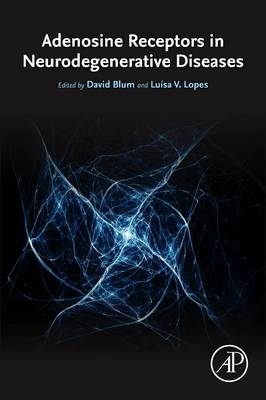
Adenosine Receptors in Neurodegenerative Diseases
Academic Press Inc (Verlag)
978-0-12-803724-9 (ISBN)
Chapters include adenosine biology and signaling, gene regulation, control of motor function, and novel adenosine-based therapies in the CNS. It is an ideal resource for researchers, advanced graduate students, clinicians, and industry scientists working in the fields of clinical neuroscience and molecular and cellular neuroscience.
Dr. David Blum is Research Director at Inserm in the “Alzheimer & Tauopathies laboratory, a founder unit of the Jean-Pierre Aubert Research Centre (UMR-S 1172; Lille, France). His group is particularly focused on how environmental factors affect brain disorders with a particular interest towards caffeine. His current topic in this field relates to the impact of adenosine receptor modulation in neurological and neurodegenerative disorders as well as to the better understanding of molecular effects of caffeine into the brain. David has also a strong interest to translate his findings towards clinical studies, epidemiological and genetics. David graduated at Strasbourg University, France; obtained his PhD in Neurosciences at Grenoble University, France in 1999; and developed post-doctoral research experience at ULB, Brussels, Belgium. He has been recruited as senior researcher at Inserm in 2006. His main contributions includes the description of the complex role of adenosine receptors in Huntington’s disease and the first demonstration of regulatory role of A2A receptor contribution in Tauopathies (with Dr. Lopes). David authors more that 90 papers with more that 2500 citations, including top Neuroscience Journals as Lancet Neurology, Molecular Psychiatry, Journal of Neuroscience, Neurobiology of Aging or Human Molecular Genetics. David serves in several editorial boards as associate editors and as expert for most Neuroscience journals and fundings agencies in his field. Luísa V. Lopes is a Group leader@iMM Lisboa, Portugal. Her current work focuses on understanding the mechanisms inducing the "early-aging" of the cognitive function. The team has extensively provided evidence for an important contribution of adenosine receptors in pathophysiological context, and their impact in noxious brain conditions such as stress, aging and neurodegeneration, being awarded by FEBS, FENS and EMBO. Luisa graduated in Lisbon in 1998 in Biochemistry and then pursued a PhD in Neurosciences being trained in the University of Cambridge, UK and at the Karolisnka Institute, Sweden. She acquired postdoctoral experience in a company setting (Nestlé Research Center; Switzerland) studying brain-gut interactions with particular focus on early-life stress. Luisa established her own research group in 2013 as recipient of an Investigator FCT position. Her contribution includes providing the crucial first evidence of a possible glucocorticoid-adenosine link in Alzheimer’s disease (with D. Blum) following previous groundwork suggesting circadian disorders as a trigger for accelerated cognitive loss. She has authored more than 40 papers in international peer-reviewed journals with over 1000 citations. These include top journals in the field of neuroscience, such as Molecular Psychiatry, Neurobiology of Ageing, Journal of Neuroscience, as a senior author; including an award publication in TINS. Luisa has also served as a Board Member of Portuguese Society for Neuroscience and got an award from DANA Alliance for her work in raising public awareness for brain research.
Section I. Physiology 1. Physiology: Adenosine receptor biology in the CNS Michael Freissmuth and Karl-Norbert Klotz 2. Physiology: Adenosine signaling throughout development Stefania Zappettini and Christophe Bernard 3. Physiology: Influence of adenosine on synaptic excitability Detlev Boison, Raquel B. Dias, Traci Plumb, Sofia Cristóvão-Ferreira and Ana Sebastiao 4. Physiology: Regulation of synaptic transmission by adenosine at the neuromuscular junction Paula Pousinha and Joaquim A. Ribeiro 5. Physiology: Gene-regulation of adenosine A2A receptors in the central nervous system Marta Barrachina, Chien-Yu Lin and Yijuang Chern
Section II. Pathology 6. Pathology: Sleep, adenosine, and neurodegeneration Theresa Bjorness and Robert W. Greene 7. Pathology: neuronal vs glial cell contribution to adenosine A2A receptor-induced neurodegeneration Antonella Ferrante, Maria Teresa Tebano, Alberto Martire, Maria Rosaria Domenici and Patrizia Popoli 8. Pathology: Adenosine and oxygen/glucose deprivation in the brain Felicita Pedata, Ilaria Dettori, Irene Fusco, Elisabetta Coppi, Anna Maria Pugliese and Alessia Melani 9. Pathology: Adenosine receptors and memory disorders Alexandre de Mendonca, David Blum and Jonathan D. Geiger 10. Pathology: Control of motor function by adenosine A2A receptors in Parkinson and Huntington disease Annalisa Pinna, Jadwiga Wardas, Maria Rosaria Domenici, Patrizia Popoli, Giovanni Cossu and Micaela Morelli 11. Pathology: Adenosine receptors oligomers in Parkinson disease Victor Fernández-Dueñas and Francisco Ciruela 12. Pathology: Adenosine control of striatal function – implications for the treatment of apathy in basal ganglia disorders Sergi Ferré
| Erscheinungsdatum | 06.04.2017 |
|---|---|
| Verlagsort | San Diego |
| Sprache | englisch |
| Maße | 152 x 229 mm |
| Gewicht | 590 g |
| Themenwelt | Medizin / Pharmazie ► Medizinische Fachgebiete ► Neurologie |
| Studium ► 1. Studienabschnitt (Vorklinik) ► Physiologie | |
| Studium ► 2. Studienabschnitt (Klinik) ► Pathologie | |
| Naturwissenschaften ► Biologie ► Humanbiologie | |
| Naturwissenschaften ► Biologie ► Zoologie | |
| ISBN-10 | 0-12-803724-5 / 0128037245 |
| ISBN-13 | 978-0-12-803724-9 / 9780128037249 |
| Zustand | Neuware |
| Haben Sie eine Frage zum Produkt? |
aus dem Bereich


